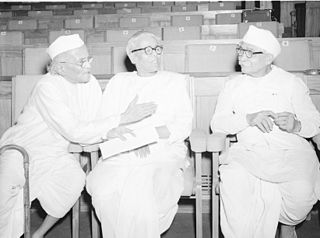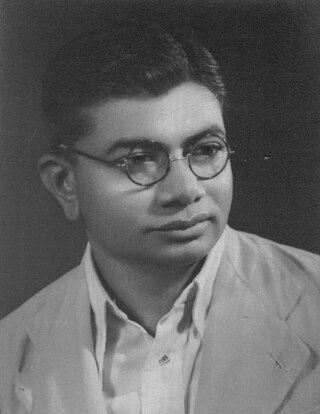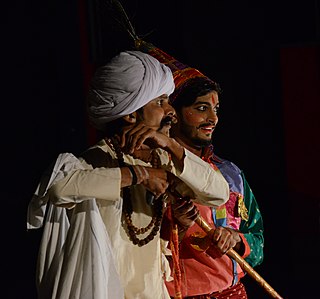Dina Pathak was an Indian actress and director of Gujarati theatre and also a film actor. She was an activist and President of the National Federation of Indian Women (NFIW).
Ranjitram Suvarna Chandrak, also known as the Ranjitram Gold Medal, was founded by Gujarat Sahitya Sabha and is considered the highest literary award in Gujarati literature. The award is named after renowned Gujarati writer Ranjitram Mehta. It is awarded since 1928.

Hamari Devrani is an Indian soap opera, which was broadcast on Star Plus during weekday afternoons from 2008 to 2012.

Esha Kansara is an Indian actress who starred in the Hindi TV serials Mukti Bandhan,Meri Bhabhi. She was also cast in the series Maddam Sir (2020) and Zindagi Mere Ghar Aana (2021).

Jaishankar Bhudhardas Bhojak, better known by his theatre name Jaishankar Sundari , was an Indian actor and director of Gujarati theatre. Starting at the young age, he rose to fame for his roles of female impersonator in early Gujarati plays. He retired from acting in 1932 but returned to theatre direction and teaching in 1948. He directed and acted in several successful plays. He was awarded the Ranjitram Suvarna Chandrak in 1951 and the Padma Vibhushan in 1971.

Madhu Rye is a Gujarati playwright, novelist and story writer. Born in Gujarat and educated at Calcutta, he started writing in the 1960s and became known for his stories and plays. His experience at the University of Hawaii introduced him to experimental writing and improvisations as writing aid, which later led to a movement against absurd theatre. He moved to the US in 1974 and has lived there since. He chiefly wrote novels, short stories and plays. His plays were successful and have been adapted into several languages and media. He has adapted his novels into plays and some plays into novels. The most notable is Kimball Ravenswood, which was loosely adapted into a Hindi TV series Mr. Yogi (1989), and a Hindi film, What's Your Rashee? (2009).

Abhinay Banker is an actor, director, and writer who works in Gujarati cinema and theatre. After several theatre performances in his early career, he received recognition for his performance in Gujarati play Welcome Zindagi (2010), written and directed by Saumya Joshi, which has been performed over 650 times worldwide. He acted in Gujarati film Kevi Rite Jaish (2012).
The Indian National Theatre (INT) is a theatre organisation and troupe founded in 1943 and based in Mumbai, India. Although performing predominantly Gujarati theatre, the troupe has also produced a number of plays in other Indian languages. In addition to theatre productions, the troupe also carries theatre education, training and research activities.

Bapulal Nayak was an Indian stage actor, director and manager of the early Gujarati theatre. Born into a family of traditional folk theatre performers, he joined the theatre company Mumbai Gujarati Natak Mandali at a young age. His acting was well received in his initial roles. He was involved in stage planning and managing and later became a partner in the company. He rose to fame and acted in several successful plays with Jaishankar Bhojak 'Sundari', who played female roles opposite him. He acted in plays written by Mulshankar Mulani, Gajendrashnakar Pandya and Nrisinh Vibhakar. He wrote and directed several plays and eventually bought the theatre company. After a career lasting five decades, he retired after his company suffered heavy loss with the advent of the cinema.

Kanta is an 1882 Gujarati play by Manilal Dwivedi, based on a historical event; the killing of King Jayshikhari of Patan by King Bhuvad of Panchasar. Dwivedi added the characters of Tarala, Haradas and Ratnadas from his own imagination and gave dramatic twists to the original story in order to make the story more suitable for a dramatic retelling. It has been called the most outstanding play of the 19th century in Gujarati literature. Reportedly, the play has elements of Sanskrit drama and Shakespearean tragedy reflected in its construction, due to Dwivedi's recent translation of Sanskrit play Malatimadhavam and studies of Shakespeare's plays. Kanta had moderate success on the stage. The Mumbai Gujarati Natak Mandali inaugurated its theatrical activities by staging this play on 29 June 1889.

Balabhai Virchand Desai, better known by his pen name Jaybhikhkhu, was a Gujarati novelist, short story writer, playwright, essayist, and biographer from Gujarat, India. He is known for his historical novels.

Pravin Joshi was an Indian stage actor and director. He was a leading figure of the commercial Gujarati theatre in the 1960–70s.
Nrusinhavatar is one of the two Gujarati plays written by Manilal Nabhubhai Dwivedi, the other is Kanta. Written probably in 1896, it recounts the puranic mythological tale of Nrusinhavatar. It was first staged by the Mumbai Gujarati Natak Company in 1899 but was unsuccessful. It was staged again in 1906-07 and became successful. It was edited and published as the book by Dhirubhai Thaker in 1955.
Gujarati Natak Mandali (1878–89) and its successor Mumbai Gujarati Natak Mandali (1889–1948) was a theatre company in Bombay, British India. It made immense contribution to the Gujarati theatre, with productions of more than hundred plays, as well as the training and introducing of many major actors and directors.
Hemang Dave is an Indian actor and singer from Gujarat, India. He works in Gujarati film. He has been a part of movies like Bey Yaar, Bas Ek Chance, Romeo & Radhika and Tamburo. His 2018 releases include Aavuj Reshe and Chhutti Jashe Chhakka. His upcoming movies are BaagadBillaa and Peti Pack.
Natya Vidya Mandir, a theatre school, and its amateur theatre troupe Natmandal from Ahmedabad, Gujarat, India had heavily influenced new Gujarati theatre. Established in 1949, it trained many theatre people and produced classic, modern and experimental plays in its twenty years of existence.

Mithyabhiman is an 1871 Gujarati play by Indian writer Dalpatram. Considered to be a milestone in Gujarati literature, it holds an important place among the comic plays in the history of Gujarati drama. The play tells a story of Jivaram Bhatt, who suffers from nyctalopia but does not want people to know about it. When he visits his father-in-law's house, he causes considerable difficulty and confusion while trying in vain to hide his disability.
Jashwant Thaker was an Indian actor, playwright and director of Gujarati theatre. He directed and acted in several successful plays. He was awarded the Sangeet Natak Akademi Award in 1968, the Ranjitram Suvarna Chandrak in 1977 and the Soviet Land Award in 1986.

Uncho Parvat, Undi Khin is a biographical play by Dhirubhai Thaker based on life of Manilal Dwivedi. It was published in 1993.